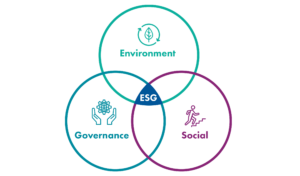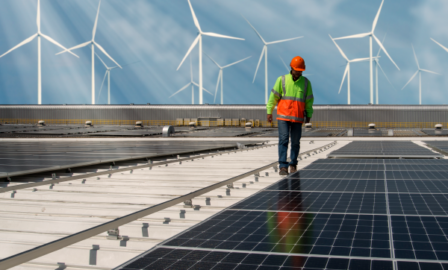Exploring Sustainability in the Retail Supply Chain
Sustainability can be traced back to early cultures, with the modern concept of sustainability attributed to Hans Carl von Carlowitz (1645 – 1714). Carlowitz formulated the initial three pillars: environmental equilibrium, economic security, and social justice. Today, the UN World Commission has made little modification to the original concept. They refer to sustainability as the development that meets the needs of the present without compromising the ability of future generations to meet their own needs. UCLA simplifies this even more when it defines sustainability as the balance between the environment, equity, and economy. In this piece, we’re taking a closer look at this balance and what retailers are doing to improve retail supply chain sustainability.
The Push for Retail Supply Chain Sustainability
As climate change, human and gender rights, and natural and environmental resource management continue to dominate current events, businesses face the challenge of how they will respond. According to Earth.org, manufacturing companies have evolved as they work to attract customers who prefer a green lifestyle, with multinational brands like Nike, Adidas, Zara, H&M, Levi’s, and others in the fashion sector taking “steps toward sustainability production, helping to reduce environmental stress and climate change.”
Additionally, car manufacturing companies BMW and Ford have rolled out their electric cars, with BMW using a technology that saves 50% energy and 70% water and allows for 95% of the vehicle to be recycled. Further, Swedish retailer IKEA has phased out single-use plastics in both manufacturing and its stores and is also working toward its goal of using 100% renewable electricity throughout its value chain.
Medium and small companies are also making changes. They’re educating themselves, advocating, and sharing information, and their innovative solutions are helping to accelerate the velocity of this particularly important business goal. Companies are changing packaging or taking processes to a new level, such as recycling glass and turning it into glass sand products to restore coastal communities. Although viewed as small steps if looked at individually, small, medium, and large companies collectively are making progress toward sustainability – also known as ESG (Environmental, Social, and Governance), a term first coined in 2005.
ESG in Retail
Many retail and consumer goods companies have accepted the ESG challenge. They’re working on identifying what ESG objectives are important to implement, working with their business partners to develop new products and processes while also implementing new and innovative solutions. Some of these ESG areas of focus include:

Environmental: Focus is on being a steward of the planet – thinking about greenhouse gas emissions, energy use, waste and pollution created, conservation of natural resources, and how animals are treated.
Social: Focus is on relationship with stakeholder – thinking about employee health and safety, fair wages, employee engagement, and community support.
Governance: Focus is internal controls for accurate and transparent accounting and reporting methods – thinking about how leadership incentives are aligned with stakeholder expectations and how board members are selected.
How Retailers are Embracing ESG
There are many examples of progress, some so simple you may not have realized the change, but others are more dramatic. Let’s take a look at a couple of ways that retailers are embracing ESG.
- Grove Collaborative: Grove Collaborative is a marketplace that strives to make sustainable and healthy choices easy and is the first plastic-neutral retailer in the world, meaning they divert the same amount of plastic from the ocean that they produce. They have a short-term goal to be plastic-free by 2025. Grove also is heavily involved with reforestation efforts and in minimizing their overall carbon footprint.
- Adidas: By 2025, Adidas plans to have nine out of 10 Adidas articles be sustainable and aim to reduce greenhouse emissions per product by 15% by 2025. The company has developed and leveraged the “Three-Loop Strategy” to guarantee product sustainability in the future: Recycled Loop (replace new plastic with recycled plastic); Circular Loop (products that can be directly recycled after being thrown away); and the Regenerative Loop (products made from natural materials such as cells or proteins that can be returned to nature at the end of their life).
- Allbirds: Allbirds – a footwear and apparel company – slashed its per-product carbon footprint by 12% from 2020 to 2021 while debuting new renewable materials such as regenerative wool and increasing its use of 100% plastic-free plant leather. Their plan is to reduce carbon by 50% by 2025 and to near zero by 2030.
- Patagonia: Always at the top of eco-friendly company lists, Patagonia has spent its 47 seven years in business being at the cutting edge of environmentally conscious business practices. Much of their raw materials are recycled or grown organically to reduce their environmental footprint – and they aim to be completely carbon neutral by 2025. For the last 35 years, they have pledged 1% of sales to the conservation of the natural environment. This practice led to Patagonia’s Founder, Yvon Chouinard, co-founding 1% for the Planet so other companies could make the same contribution to environmental protection.
- Sprouts farmer’s market made Corporate Knights’ 2023 Global 100 list of the world’s most sustainable corporations. They take a systematic approach to managing waste and recyclables in all operations, which is based on the ISO 14001 environmental management protocol. Their highest priority continues to be on recovering food that is not in retail condition yet can be donated or repurposed for a higher use to reduce food waste.
- ALDI, another grocery retail giant, hasn’t offered single-use plastic shopping bags for more than four decades, continuing to encourage shoppers to bring their own reusable bags. Further, the company has pledged to remove all plastic shopping bags from its stores by the end of 2023, an initiative that is estimated to remove 4,400 tons of plastic from circulation every year.
- Whole Foods, one of the top 100 retailers in the last year, is pledging to cut food waste in half by 2030. Joined by Amazon, their commitment means that they will reduce food waste by 50% over the next 10 years as part of the U.S. Food Loss and Waste 2030 Champions commitment. Whole Foods is also addressing food waste with its composting programs and use of the waste recycling system Grind2Energy, which has helped to divert 12,500 tons of food waste at its stores since 2014.
- Kroger’s has lofty 2030 sustainable packaging goals, which include 100% recyclable, reusable, and/or compostable Our Brands packaging by 2030. This includes packaging for grocery and fresh food products, as well as health, beauty, household supplies, and cleaning items.
Retail Supply Chain Sustainability: ESG is Here to Stay
At last count, there were more than 25 different ESG rating agencies around the world; some focus only on large cap companies, and some on a single ESG factor, like corporate governance. It’s reported that more than 90% of S&P 500 companies now publish ESG reports as do approximately 70% of Russell 1000 companies.
However, there has been opposition to ESG. Some see it as a distraction or a public relations move, saying it’s not feasible because it’s intrinsically difficult, it’s not measurable, and there’s no meaningful relationship with financial performance. Conversely, stakeholders supporting ESG have seen backing by the likes of the U.S. Securities and Exchange Commission (SEC), which is considering new rules that would require more detailed disclosure of climate-related risks and greenhouse gas emissions. Additionally, in April 2021, the EU Commission adopted the sustainable financial package, which has expanded the scope of more than 50,000 companies that now must report on ESG issues.
Bottom line – ESG is here to stay. Climate change, human rights, and social capital issues are all a part of a circular economy, and it’s important for retailers to understand how even the smallest of changes can have a positive impact. Whether you’re just starting to set an ESG strategy or getting ready to publish your next report, Clarkston can provide expertise on ESG best practices in the supply chain.
Subscribe to Clarkston's Insights
Contributions from Linda Plumley



